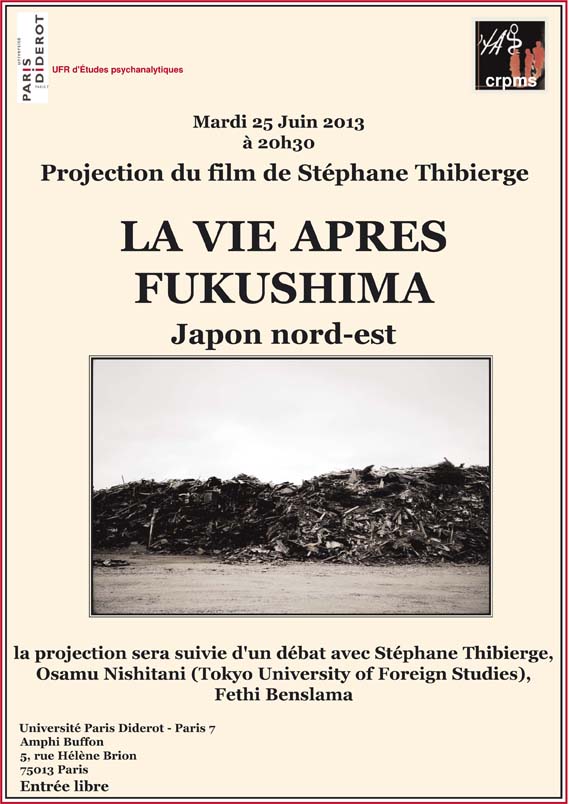Thibierge, Stéphane. La vie après Fukushima. 2013. SODAPERAGA & Les Films du Paradis Productions.
A French man—psychoanalyst and photographer who lived in Japan—investigates the daily lives of people in the region devastated on 11 March 2011 and after. At that time, the entire world has seen the images of people in a state of confusion and distress of a huge disaster. They were dignified and aghast.
“At the moment, I said to myself: Japan is going to be submerged by water, I thought: Japan is disappearing, it is over, the mobile phones were not working, nor television, nor electricity, nor water.” (From an interview in the film)
On 11 March 2011, the whole world saw the people in northeast Japan damaged by an earthquake and by an abnormal tsunami. What happened to all these people? What do they tell us? How do they deal with what happened, and with the trauma? This is the subject of the film “La vie après Fukushima” (The life after Fukushima). This film is about the life after what happened on that day.
Trailer (3 min): https://www.youtube.com/watch?v=PIOrUnJyDxA
Hana Sim, Ecole des hautes études en sciences sociales (EHESS)
Filmmaker and psychoanalyst Stéphane Thibierge teaches psychopathology at the University of Poitiers. Below is an interview with Thibierge, translated by Hana Sim.
Why did you decide to make a documentary in northeast Japan one year after the disaster which affected this region?
I lived in Japan for several years and I speak the language. I learned photography there. I have some friends, too. I could not remain indifferent to what is happening in Japan. After seeing the images of disaster of 11 March 2011, I realized that I could not stay with theses photos, with this kind of information. We have seen people dying before our eyes, we heard about a nuclear power plant which is exploding, smoking. We didn’t understand anything about what is happening. We couldn’t do anything with that. I said to myself at one point: you have to go there, to realize the situation on site. I thought that writing a scientific article on psychopathology about the morale of its population would serve no purpose; since I make films, I’ll make one. I shot it in eight days and nights. It’s very interesting from the movie’s point of view: we have no room for error.
How did the residents feel about your initiative?
The people I met were really moved by the fact that we were interested in them. The Japanese people are very discreet and don’t talk very easily about their feelings. It has been necessary to be very tactful and persuasive. They understood that I was not there for voyeurism but to talk about them and about their situation. They did interviews with loving kindness and dignity.
Can the wounds be healed after such a disaster ?
The situation is very difficult. The stress, the fear, the anxiety are increasing. It’s because of the Fukushima disaster. In Japan, we know the earthquakes, the tsunamis, but there was the explosion of the nuclear power plant. This film shows that the explosion is a very frightening black hole that nobody is talking about. Fukushima is not a natural catastrophe; it’s a human catastrophe.
Do you denounce the danger that the nuclear represents?
What happens in the Fukushima region is a phenomenon which concerns the entire world. In the case of a major accident at Civaux*, our lives would be destroyed in a few minutes. We don’t have the least bit of information. I do not intend to be a unmasker; it’s a citizen’s viewpoint.
*The Civaux nuclear power station is situated approximately 34 km southeast of Poitiers, where the interview took place.
![[Teach311 + COVID-19] Collective](https://blogs.ntu.edu.sg/teach311/files/2020/04/Banner.jpg)
